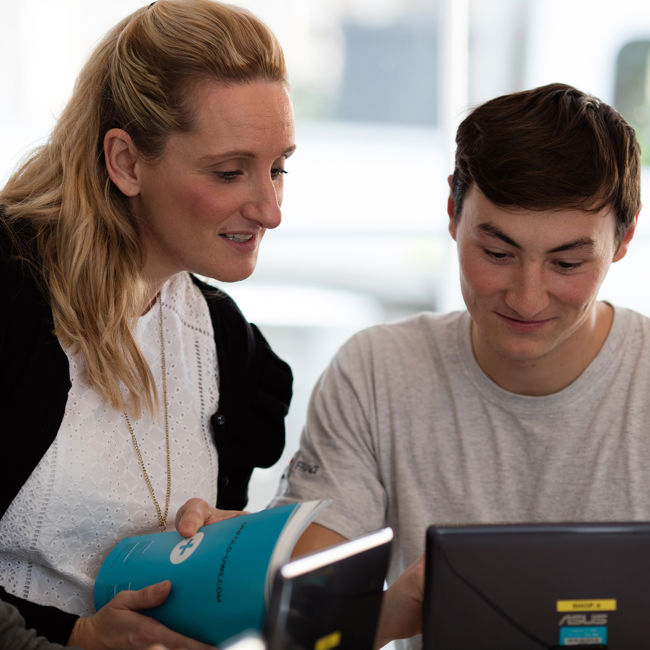Mathematics
Award
BSc (Hons)
Duration & study mode
4 years, full-time
School
Computing, Engineering & Physical Sciences
Location
Paisley
Ucas code
G100
Course starting dates
-
Paisley: September
This programme is in clearing for students resident in Scotland, Rest of the UK, Republic of Ireland, EU.
During Clearing our entry requirements remain flexible, and we are committed to providing opportunities to study with us based on a range of qualifications. Please get in touch, and we can discuss your specific circumstances.
You can apply now through UCAS or find out more information about the Clearing process on our dedicated Clearing hub.

Join the BSc (Hons) Mathematics to learn how mathematics underpins and describes the world around us.
Build the knowledge and skills required to excel in a multitude of professional sectors including finance, engineering, programming, teaching, and mathematical research.
This programme will provide you with a broad understanding of key areas of mathematics, with options to individualise your degree at the later stages. Choose to study topics from a range of options including statistics, number theory, numerical analysis, and mathematical biology.
Our Programme Leaders have recorded videos to help you discover all there is to know about our courses. From professional accreditation to programme modules and career opportunities, our Programme Leaders will help answer all your questions. You can view the video for this course by clicking the link below.

Following graduation from the BSc (Hons) Mathematics programme, you’ll leave UWS with career options in finance, research, the tech sector, and many more. Mathematics graduates are highly sought after across all areas due to their analytical and critical thinking skills.
Honours graduates may choose to pursue further study of Mathematics and/or Statistics through Masters or Doctoral programmes at this or other universities.
Science courses at UWS have been developed in collaboration with industrial, professional and educational partners. Underpinned by research that is internationally leading, our degrees enable students to make a real-world impact.
Our students graduate ready for a successful career or further study in their chosen scientific field.
We welcome Scottish, UK and international students and consider all applicants on an individual basis.
During Clearing our entry requirements remain flexible, and we are committed to providing opportunities to study with us based on a range of qualifications. Please get in touch, and we can discuss your specific circumstances.
Direct entry to Year 2 (with an appropriate HNC) may be possible.
Alternative pathway to entry is available through our new summer school. More information about the summer school is available by contacting the Programme Leader by emailing ceps@uws.ac.uk
* for more information on standard and minimum entry requirements, see our Undergraduate Entry Requirements webpage
All academic degrees/awards at UWS are taught in English. For applicants whose first language is not English*, the University sets a minimum English Language proficiency level. All English language qualifications must have been gained within two years of the start of your UWS course.
* applicants who are exempt from english language requirements include:
In general terms, if you are applying to study a course at, or above, Year 1 (SCQF Level 7) bachelor’s degree level, then the UKVI’s minimum level of English proficiency is Common European Framework for References of Languages (CEFR) at B2 (Upper Intermediate).
At UWS, we define our general English language requirements using the International English Language Testing System (IELTS) Academic module (not General Training) as follows:
These are minimum requirements and some courses may require a higher standard for admission†.
† Exceptions to this level of IELTS scoring exist for some accredited or professionally-recognised courses (see IELTS Score Exceptions section below for more information).
For our research degrees (MRes, MPhil, PhD, DBA, DProf) applicants are required to have an IELTS score as follows:
For Health, Nursing & Midwifery courses that lead to professional registration with the Nursing & Midwifery Council (BSc Adult Nursing, MSc Adult Nursing, BSc Mental Health Nursing, MSc Mental Health Nursing, BSc Midwifery and MSc Midwifery), applicants are required to have an IELTS score as follows:
Our BSc Paramedic Science degree leads to professional registration with the Health and Care Professions Council (HCPC); it has different IELTS requirements than other Health-related courses. Although it is not possible to apply for this degree directly as an international student, for applicants who meet SAAS residency requirements and for whom English is not their first language, then the following IELTS scores are required:
For our BSc (Hons) Applied Biomedical Science, BSc (Hons) Biomedical Science and MSc Advanced Biomedical Science degrees, which may lead to professional registration with the Health and Care Professions Council (HCPC), applicants are required to have an IELTS score as follows:
Our BA (Hons) Social Work and MSc Social Work degrees are professionally recognised by the Scottish Social Services Council and applicants are required to have an IELTS score as follows:
For our Certificate of Higher Education courses, applicants are required to have an IELTS score as follows:
In additional to IELTS, we also accept a number of alternative English language for application and admission to our courses for both home/EU and international students at bachelor's degree study at Year 3 (SCQF Level 9), and above. From Cambridge to TOFEL iBT qualifications the number of these qualifications is extensive.
Find out about non-IELTS English Language Tests
UWS has also reviewed a range of High / Secondary School qualifications studied by non-EU applicants that can be used as a basis of entry to a UWS. These range from Botswana GCSEs to USA High School Graduation Diplomas, the number of these qualifications is extensive.
Find out more about international English Language high-hchool qualifications
Applicants who do not meet the minimum English language requirements have the option to study one of our preparatory and pre-sessional English courses. The UWS courses available are:
This programme aims to instil you with the skills and attributes that are transferable to many areas of study and professional employment. These include:
In Year 1 you will study five core Mathematics / Statistics modules and a module on Professional Skills.
In Year 2, you will study core modules in Multivariable Calculus, Probability & Statistics, Discrete Mathematics, Linear Algebra, Differential Equations and Professional Skills.
In Year 3, alongside a specialist core module in Mathematics, you can further personalise your degree with option modules including in Statistical Inference, Mechanics, and Abstract Algebra.
Knowledge and understanding of Advanced Mathematics is developed in Year 4, with options including Experimental Design, Mathematical Biology, and Coding and Cryptography.
You will also undertake a research dissertation where your knowledge can be applied to an extended project in a range of areas.
You will be taught through a combination of lectures, tutorials, computer laboratory sessions, and workshops. You will also have the opportunity to take part in group work and independent learning to develop your transferable skills such as research, presentation, communication, and working as part of a team.
This degree is assessed using a variety of assessment methods including:
Programme Specification and Module Descriptors for Undergraduate and Postgraduate courses are available to download (PDFs). These provide you with core information concerning your chosen subject.
£1,820 cost per year of study (usually paid by the Scottish Government via SAAS*)
£9,250 Cost per year of study, but not more than £27,750
£9,250 Cost per year of study, but not more than £27,750
£18,000 per year of study
£305 per module (20 credits)
£1,550 per module (20 credits)
£1,550 per module (20 credits)
£3,000 per module (20 credits)
This programme is in clearing for students resident in Scotland, Rest of the UK, Republic of Ireland, EU.
Those not applying through an agent or partner, should apply through UCAS (Universities and Colleges Admissions Service).
Clearing for 2024 runs from 5 July through to 21 October. Spaces are limited, therefore we encourage application as soon as possible.
During Clearing our entry requirements remain flexible, and we are committed to providing opportunities to study with us based on a range of qualifications. Please get in touch, and we can discuss your specific circumstances.
If you are using Clearing to apply for University for the first time, you’ll need to register with UCAS and submit an application. Find out more about applying through Clearing. A small number of courses will require applications to be made directly to UWS. This will be noted where required.
For those looking to apply outside of Clearing 2024, the on-time application deadline for 2025/26 entry is 31 January 2025, 18:00 (UK time). For some courses it may still be possible to apply beyond this period, subject to suitable vacancies remaining. The final deadline for late applications via UCAS is 30 June 2025.
Please refer to our Undergraduate Application Guide for domestic & EU/EEA to find more information on when and how to apply to study at UWS.
For applications and more information on applying in 2025, please visit www.ucas.com
Students from non-EU/non-EEA countries can apply directly to UWS via our dedicated online application system. The latest we can process your application is 6 weeks before the course start date to allow for visa processing times. For more information on when and how to apply to study at UWS please refer to our International Undergraduate Application Guide.
For part-time & online study, you should apply directly to the University through our online application system, not through UCAS. Please select the part-time mode of study when submitting your application. Before you begin your application, it is important to read the part-time application step-by-step guide for a smooth process.
To come to UWS as a visiting student on a study abroad or exchange programme, you must apply entirely through our online system.
Our Clearing team is here to help, so please get in touch if you have any questions and need to know more about applying for this course.
You can also find out more information about Clearing on our dedicated Clearing pages.
We will always try to make sure that we publish accurate course information but we do not accept responsibility for any mistakes or omissions. We will also try to make sure that we deliver our courses in line with our published information. However, we may not always be able to do so and you can find further information about this in our enrolment terms and conditions.